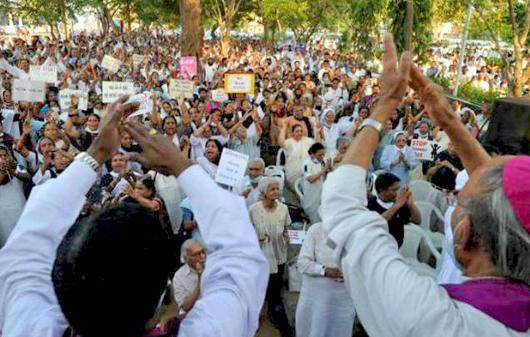Washington, Jun 26: Religion-based violence in Indian society “continued to be a concern,” during the first year of Narendra Modi’s rule as Prime Minister, according to a report on worldwide human rights abuses released by the U.S. State Department
In its annual Country Reports on Human Rights Practices unveiled on Thursday the Department said that the most significant human rights problems were police and security force abuses, including extrajudicial killings, torture, and rape; widespread corruption that contributed to ineffective responses to crime, including those against women and members of scheduled castes or tribes; and societal violence based on gender, religious affiliation, and caste or tribe.

The report alluded to “several instances” during the 2014 general elections, in which individuals faced arrest for allegedly posting political comments on Facebook.
It cited in particular the case of Goa-based Devu Chodankar who was the subject of a complaint filed on May 23, 2014, allegedly for urging community members on Facebook not to vote for Mr. Modi.
Following this “police detained and interrogated Chodankar for allegedly accusing Modi of planning a holocaust against Muslims and Christians… [and] confiscated Chodankar’s computer and other related items,” the report noted.
While the report referenced some states’ laws restricting religious conversion, the Department also appeared to have closely tracked a report submitted to the Indian government by three senior police officials from Maharashtra, Uttar Pradesh, Tamil Nadu, and one Intelligence Bureau representative entitled ‘Strategy for Making Police Forces More Sensitive Towards Minority Sections,’ which the report said “acknowledged bias within the police force against Muslims and reported the Muslim perception of police as communal, biased, and insensitive.”
Last summer in some areas such as Bastar district of Chhattisgarh numerous village councils passed resolutions banning non-Hindu religious “propaganda,” prayers, and speeches in their villages, the Department said.
Additionally the report highlighted communal violence in Pune in late May, wherein social media posts triggered multiple arson attacks on Muslim-owned shops and mosques and an assault against a Muslim cleric.
It underscored the June 2 incident in which a group beat Mohsin Shaikh, who was returning from prayers in Pune, to death, allegedly targeting him for his “Muslim appearance.” In that case police arrested members of the Hindu Rashtra Samiti and pressed murder charges against its chief, Dhananjay Desai, the Department added.
Similar to previous reports on religious freedoms issued by the U.S. government, this week’s report also drew attention to concern expressed by civil society activists “about the Gujarat government’s failure to hold accountable those responsible for the 2002 communal violence in Gujarat.”
More broadly, other human rights problems of India that found mention in the report include disappearances, hazardous prison conditions, arbitrary arrest and detention, and lengthy pre-trial detention, all exacerbated by a judiciary that “remained backlogged, leading to lengthy delays and the denial of due process.”





Comments
Add new comment